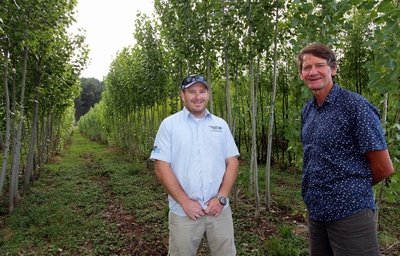Erosion-controlling poplars, willows available again soon
27 Feb 2017, 12:39 PM
Hill country farmers whose erosion-prone properties drain to the Kaipara Harbour may be eligible for a share of more than 3500 free poplar poles in a joint Northland Regional Council-Ministry for Primary Industries initiative.
The council and ministry are currently two years into a four-year project targeting areas of high erosion risk on hill country properties in the very large greater Kaipara catchment which drains roughly one-third of Northland.
The parties split the annual costs of providing the poles, which would be worth up to $40,000 retail, as part of their shared efforts to combat Northland’s high sedimentation rates.
 Poplar and Willow Co-ordinator Wayne Teal, left, and Coastal South Constituency representative Councillor Rick Stolwerk at the council's poplar and willow nursery near Whangarei.
Poplar and Willow Co-ordinator Wayne Teal, left, and Coastal South Constituency representative Councillor Rick Stolwerk at the council's poplar and willow nursery near Whangarei.
Regional councillor Rick Stolwerk says priority is given to applicants in areas the council has identified as especially erosion-prone. Similarly, those who already have Farm Water Quality Improvement Plans or specific planting plans with council will also rank highly.
Councillor Stolwerk says outside of the Kaipara initiative, the council is also offering half-price poplars and willows from its Flyger Rd, Mata nursery near Whangarei to other Northland landowners keen to help control erosion and protect water quality.
Once again, this year’s pole supply is being sourced from the council’s in-house poplar and willow nursery in Cr Stolwerk’s Coastal South constituency.
He says the council set up the 6.3ha nursery at Mata several years ago after becoming frustrated with the limited supply of suitable poles in Northland and being unable to find anyone able to grow large numbers on its behalf.
It plans to expand the nursery by another 2.2ha this season to cater for current and anticipated future demand.
About 6000 three-metre poplar poles and a similar number of smaller poles ranging from 1.5m to 3.0m will be harvested soon from the nursery to supply both the Kaipara and wider north.
Councillor Stolwerk advises anyone interested in securing some of the poles – either partially or fully subsidised – to contact council land management staff as soon as possible to arrange a consultation and site visit.
He says the council sells the 3.0m poles (which usually retail for up to $10 each) for just $5.00 (incl GST), provided landowners already have – or agree to – a farm water quality improvement planting plan or planting plan.
“This is to ensure the trees are planted appropriately and future maintainance is allowed for.”
The fast-growing poplars and willows have broad and binding root systems and have been used widely for many years to prevent and control erosion, nutrient losses and cut waterway pollution.
Interested landowners should contact the Land Management Team directly on 0800 002 004 as soon as possible to allow time to arrange a farm visit to undertake a required planting plan. Orders can be made while stocks last or until Wednesday 31 May 2017 (whichever is earlier).
Councillor Stolwerk says the best time to plant the trees in Northland is typically from June to mid-August and while the two species aren’t native, they’re favoured because their rapid growth rates means they begin to control erosion within as little as three years.
“These trees play a pivotal role in stabilising land and slowing hillslope erosion. Erosion and resulting sedimentation of waterways and receiving harbours is one of Northland’s most problematic waterway contaminants.”
Councillor Stolwerk says everything people need to know about establishing poplars and willows is also available from the council’s website via: www.nrc.govt.nz/poplars
